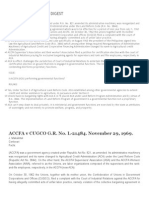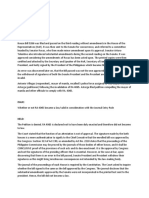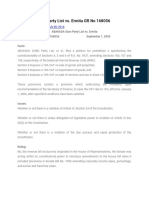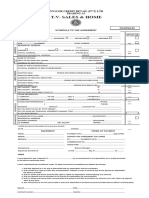0 ratings0% found this document useful (0 votes)
566 viewsKilosbayan vs. Morato
Kilosbayan vs. Morato
Uploaded by
Celedonio ManubagThe Supreme Court ruled that the petitioners did not have standing to challenge the Equipment Lease Agreement (ELA) between the Philippine Charity Sweepstakes Office (PCSO) and Philippine Gaming Management Corporation (PGMC). While the petitioners had standing in a previous case involving a different contract, the doctrine of stare decisis did not apply because the present case involved a separate contract. As the ELA is a distinct agreement from the prior contract, the issue of the petitioner's standing could be independently examined. The appropriate issue was whether the petitioners qualified as real parties in interest, rather than having standing, since no constitutional question was actually involved in the challenge to the ELA.
Copyright:
© All Rights Reserved
Available Formats
Download as DOCX, PDF, TXT or read online from Scribd
Kilosbayan vs. Morato
Kilosbayan vs. Morato
Uploaded by
Celedonio Manubag0 ratings0% found this document useful (0 votes)
566 views2 pagesThe Supreme Court ruled that the petitioners did not have standing to challenge the Equipment Lease Agreement (ELA) between the Philippine Charity Sweepstakes Office (PCSO) and Philippine Gaming Management Corporation (PGMC). While the petitioners had standing in a previous case involving a different contract, the doctrine of stare decisis did not apply because the present case involved a separate contract. As the ELA is a distinct agreement from the prior contract, the issue of the petitioner's standing could be independently examined. The appropriate issue was whether the petitioners qualified as real parties in interest, rather than having standing, since no constitutional question was actually involved in the challenge to the ELA.
Original Description:
xxxxxx
Copyright
© © All Rights Reserved
Available Formats
DOCX, PDF, TXT or read online from Scribd
Share this document
Did you find this document useful?
Is this content inappropriate?
The Supreme Court ruled that the petitioners did not have standing to challenge the Equipment Lease Agreement (ELA) between the Philippine Charity Sweepstakes Office (PCSO) and Philippine Gaming Management Corporation (PGMC). While the petitioners had standing in a previous case involving a different contract, the doctrine of stare decisis did not apply because the present case involved a separate contract. As the ELA is a distinct agreement from the prior contract, the issue of the petitioner's standing could be independently examined. The appropriate issue was whether the petitioners qualified as real parties in interest, rather than having standing, since no constitutional question was actually involved in the challenge to the ELA.
Copyright:
© All Rights Reserved
Available Formats
Download as DOCX, PDF, TXT or read online from Scribd
Download as docx, pdf, or txt
0 ratings0% found this document useful (0 votes)
566 views2 pagesKilosbayan vs. Morato
Kilosbayan vs. Morato
Uploaded by
Celedonio ManubagThe Supreme Court ruled that the petitioners did not have standing to challenge the Equipment Lease Agreement (ELA) between the Philippine Charity Sweepstakes Office (PCSO) and Philippine Gaming Management Corporation (PGMC). While the petitioners had standing in a previous case involving a different contract, the doctrine of stare decisis did not apply because the present case involved a separate contract. As the ELA is a distinct agreement from the prior contract, the issue of the petitioner's standing could be independently examined. The appropriate issue was whether the petitioners qualified as real parties in interest, rather than having standing, since no constitutional question was actually involved in the challenge to the ELA.
Copyright:
© All Rights Reserved
Available Formats
Download as DOCX, PDF, TXT or read online from Scribd
Download as docx, pdf, or txt
You are on page 1of 2
CASE DIGEST
KILOSBAYAN vs. MANUEL L. MORATO
G.R. No. 118910. November 16, 1995.
FACTS:
In Jan. 25, 1995, PCSO and PGMC signed an Equipment Lease Agreement (ELA)
wherein PGMC leased online lottery equipment and accessories to PCSO. (Rental of
4.3% of the gross amount of ticket or at least P35,000 per terminal annually). 30% of
the net receipts is allotted to charity. Term of lease is for 8 years. PCSO is to employ its
own personnel and responsible for the facilities. Upon the expiration of lease, PCSO
may purchase the equipment for P25 million. Feb. 21, 1995. A petition was filed to
declare ELA invalid because it is the same as the Contract of Lease Petitioner's
Contention: ELA was same to the Contract of Lease.. It is still violative of PCSO's
charter. It is violative of the law regarding public bidding. It violates Sec. 2(2) of Art. 9-D
of the 1987 Constitution. Standing can no longer be questioned because it has become
the law of the case Respondent's reply: ELA is different from the Contract of Lease.
There is no bidding required. The power to determine if ELA is advantageous is vested
in the Board of Directors of PCSO. PCSO does not have funds. Petitioners seek to
further their moral crusade. Petitioners do not have a legal standing because they were
not parties to the contract
ISSUES:
Whether or not the petitioners have standing?
HELD:
NO. STARE DECISIS cannot apply. The previous ruling sustaining the standing of the
petitioners is a departure from the settled rulings on real parties in interest because no
constitutional issues were actually involved. LAW OF THE CASE cannot also apply.
Since the present case is not the same one litigated by theparties before in Kilosbayan
vs. Guingona, Jr., the ruling cannot be in any sense be regarded as the law of this case.
The parties are the same but the cases are not. RULE ON CONCLUSIVENESS cannot
still apply. An issue actually and directly passed upon and determine in a former suit
cannot again be drawn in question in any future action between the same parties
involving a different cause of action. But the rule does not apply to issues of law at least
when substantially unrelated claims are involved. When the second proceeding involves
an instrument or transaction identical with, but in a form separable from the one dealt
with in the first proceeding, the Court is free in the second proceeding to make an
independent examination of the legal matters at issue. Since ELA is a different contract,
the previous decision does not preclude determination of the petitioner's standing.
STANDING is a concept in constitutional law and here no constitutional question is
actually involved. The more appropriate issue is whether the petitioners are REAL
PARTIES in INTEREST.
You might also like
- Contracts Outline BurtonDocument28 pagesContracts Outline BurtonAnna DeWallNo ratings yet
- 1 Text Book Construction Contract ManagementDocument25 pages1 Text Book Construction Contract Managementvkvarun11100% (1)
- IBP Vs ZamoraDocument2 pagesIBP Vs ZamoraJames Dy100% (10)
- Kilosbayan vs. MoratoDocument3 pagesKilosbayan vs. MoratoIya Paderna100% (2)
- Kilosbayan Vs MoratoDocument3 pagesKilosbayan Vs MoratoRmLyn MclnaoNo ratings yet
- Consti Digested Case - Francisco vs. House of RepresentativesDocument2 pagesConsti Digested Case - Francisco vs. House of RepresentativesErnest Godfrey Tejada100% (3)
- Angara Vs Electoral Commission DigestDocument1 pageAngara Vs Electoral Commission DigestGary Egay0% (1)
- Digest Belgica v. Executive SecretaryDocument72 pagesDigest Belgica v. Executive SecretaryJimsking SitoyNo ratings yet
- People V Vera Case DigestDocument2 pagesPeople V Vera Case DigestNap Gonzales80% (10)
- Kilosbayan, Incorporated vs. Morato and MRDocument5 pagesKilosbayan, Incorporated vs. Morato and MRRenz AyongaoNo ratings yet
- Notes On Bar-Bench RelationshipDocument10 pagesNotes On Bar-Bench RelationshipIbrahim Barkindo100% (2)
- Kilos Bayan Vs Morato DigestDocument2 pagesKilos Bayan Vs Morato DigestArde ButirikNo ratings yet
- Kilosbayan Vs MoratoDocument4 pagesKilosbayan Vs MoratoKang Minhee100% (2)
- 41) KB v. MoratoDocument3 pages41) KB v. MoratoJovelan V. EscañoNo ratings yet
- Kilosbayan Vs MoratoDocument3 pagesKilosbayan Vs Moratokrisipsaloquitur100% (3)
- Kilosbayan V MoratoDocument2 pagesKilosbayan V MoratoJoseph MacalintalNo ratings yet
- Francisco vs. House of Representeatives G.R. NoDocument3 pagesFrancisco vs. House of Representeatives G.R. NoJacinth DelosSantos DelaCernaNo ratings yet
- 06 US V ANG TANG HO Digest With Full CaseDocument14 pages06 US V ANG TANG HO Digest With Full CaseThirdy DemonteverdeNo ratings yet
- US Vs DorrDocument7 pagesUS Vs DorrMary Christine Cesara DaepNo ratings yet
- Accfa VS Cugco Case DigestDocument17 pagesAccfa VS Cugco Case DigestJey Rhy100% (1)
- Merritt and Supra - Case DigestDocument2 pagesMerritt and Supra - Case DigestDivineDionneNo ratings yet
- Digest of Astorga vs. VillegasDocument1 pageDigest of Astorga vs. VillegasPatty PerezNo ratings yet
- US v. BARRIAS DIGESTDocument2 pagesUS v. BARRIAS DIGESTCherry Sormillo100% (1)
- PVTA Vs CIRDocument1 pagePVTA Vs CIRRochelle Ann ReyesNo ratings yet
- Arnault Vs NazarenoDocument2 pagesArnault Vs NazarenoLexHope LagarasNo ratings yet
- Bases Conversion and Development Authority vs. Commission On Audit G.R. No. 178160, 26 February 2009 FactsDocument1 pageBases Conversion and Development Authority vs. Commission On Audit G.R. No. 178160, 26 February 2009 Factsaudrich carlo agustinNo ratings yet
- Tatad Vs Secretary of Energy DIGEST PDFDocument4 pagesTatad Vs Secretary of Energy DIGEST PDFNapoleon Sango IIINo ratings yet
- The Republic of The Philippines v. The People's Republic of ChinaDocument2 pagesThe Republic of The Philippines v. The People's Republic of ChinaHornbook RuleNo ratings yet
- Gonzales Vs ComelecDocument2 pagesGonzales Vs ComelecMaria Cherrylen Castor QuijadaNo ratings yet
- Standard Charter Bank Vs Senate Committee in BankDocument3 pagesStandard Charter Bank Vs Senate Committee in BankJerome C obusanNo ratings yet
- IBP Vs Zamora DigestDocument4 pagesIBP Vs Zamora DigestArde Butirik100% (1)
- Gordon v. VeridianoDocument2 pagesGordon v. VeridianoMikhael OngNo ratings yet
- Francisco Vs House of Representatives Case DigestDocument2 pagesFrancisco Vs House of Representatives Case DigestKeziah Cyra Papas50% (2)
- Sevilla - Highlighted ( (Original Source: Digest - PH)Document9 pagesSevilla - Highlighted ( (Original Source: Digest - PH)Magr EscaNo ratings yet
- PCGG vs. MigrinoDocument4 pagesPCGG vs. MigrinocymonNo ratings yet
- Gonzales Vs MacaraigDocument1 pageGonzales Vs MacaraigKGTorresNo ratings yet
- Trillanes Vs Pimentel (2) - G.R. No. 179817, June 27, 2008Document2 pagesTrillanes Vs Pimentel (2) - G.R. No. 179817, June 27, 2008Dyan100% (3)
- Abakada Guro Party List vs. Ermita (G.R. No. 168056, September 1, 2005)Document4 pagesAbakada Guro Party List vs. Ermita (G.R. No. 168056, September 1, 2005)Jennilyn Gulfan Yase100% (2)
- US Vs Ang Tang Ho 43 Phil 1 Case Digest Administrative LawDocument2 pagesUS Vs Ang Tang Ho 43 Phil 1 Case Digest Administrative LawOwen Buenaventura75% (4)
- Landicho Vs Lorenzo Relova 22 SCRA 731Document2 pagesLandicho Vs Lorenzo Relova 22 SCRA 731randelrocks2100% (1)
- 11.mapa vs. ArroyoDocument3 pages11.mapa vs. ArroyoKate Bianca Caindoy100% (1)
- Co Kim Chan V Valdez Tan KehDocument2 pagesCo Kim Chan V Valdez Tan KehMario Labitad Anore Jr.No ratings yet
- Matabuena V Cervantes-DigestDocument1 pageMatabuena V Cervantes-DigestGlenda Mae GemalNo ratings yet
- Angara vs. Electoral Commission Case Digest 1Document1 pageAngara vs. Electoral Commission Case Digest 1Bai Amira HadjiesmaelNo ratings yet
- Santiago V GuingonaDocument4 pagesSantiago V GuingonaRR F100% (3)
- JOVITO R. SALONGA vs. HON. ERNANI CRUZ PAÑODocument4 pagesJOVITO R. SALONGA vs. HON. ERNANI CRUZ PAÑOGab EstiadaNo ratings yet
- Ople vs. TorresDocument2 pagesOple vs. TorresJovelan V. EscañoNo ratings yet
- Republic vs. Feliciano (Case Digest) - Trugillo Eh 306 (Volunteer)Document2 pagesRepublic vs. Feliciano (Case Digest) - Trugillo Eh 306 (Volunteer)NocQuisaotNo ratings yet
- Tanada V CuencoDocument3 pagesTanada V CuencoCedrickNo ratings yet
- Demetria Vs AlbaDocument1 pageDemetria Vs Albarm2803No ratings yet
- Case Digest - Bustos v. Lucero - GR No L-2068 - 20 October 1948Document2 pagesCase Digest - Bustos v. Lucero - GR No L-2068 - 20 October 1948Kenneth TapiaNo ratings yet
- Cruz v. Secretary, G.R. No. 135385, December 6, 2000Document2 pagesCruz v. Secretary, G.R. No. 135385, December 6, 2000Abby PajaronNo ratings yet
- US V Ang Tang Ho DigestDocument1 pageUS V Ang Tang Ho DigestAbraham Basilio100% (2)
- Sergio Osmeña, Jr. Vs Salipada PendatunDocument1 pageSergio Osmeña, Jr. Vs Salipada PendatunJoan PabloNo ratings yet
- Civil Liberties Union Vs Exec. SecretaryDocument1 pageCivil Liberties Union Vs Exec. SecretarySquadrant TenNo ratings yet
- Integrated Bar of The Philippines v. ZamoraDocument2 pagesIntegrated Bar of The Philippines v. ZamoraHoward TuanquiNo ratings yet
- Kilosbayan vs. Manuel L. Morato: FactsDocument1 pageKilosbayan vs. Manuel L. Morato: FactsZydalgLadyz NeadNo ratings yet
- Kilosbayan Vs MoratoDocument1 pageKilosbayan Vs MoratoCarlo Jose BactolNo ratings yet
- KILOSBAYAN vs. MANUEL L. MORATO G.R. No. 118910. November 16, 1995Document1 pageKILOSBAYAN vs. MANUEL L. MORATO G.R. No. 118910. November 16, 1995Michael Renz PalabayNo ratings yet
- Kilosbayan vs. MoratoDocument1 pageKilosbayan vs. MoratoLady Paul SyNo ratings yet
- Histo Kilosbayan CasesDocument2 pagesHisto Kilosbayan CasesTelle MarieNo ratings yet
- Kilosbayan Vs Morato DigestDocument3 pagesKilosbayan Vs Morato DigestViner Hernan Santos50% (2)
- Facts of The Case:: PHIL 171-199)Document2 pagesFacts of The Case:: PHIL 171-199)pat de quirosNo ratings yet
- Metrobank Vs ReynadoDocument3 pagesMetrobank Vs ReynadoCeledonio ManubagNo ratings yet
- 05 Jurisdiction of The MTCDocument55 pages05 Jurisdiction of The MTCCeledonio Manubag100% (1)
- Third Division: DecisionDocument9 pagesThird Division: DecisionCeledonio ManubagNo ratings yet
- Know When & How To Use, Where To and Who Can File The Following Remedies: A. Ordinary Environmental Civil ActionDocument10 pagesKnow When & How To Use, Where To and Who Can File The Following Remedies: A. Ordinary Environmental Civil ActionCeledonio ManubagNo ratings yet
- Lecture-Outline Clean Air ActDocument11 pagesLecture-Outline Clean Air ActCeledonio ManubagNo ratings yet
- TrustsDocument2 pagesTrustsCeledonio ManubagNo ratings yet
- Mabeza Vs NLRCDocument2 pagesMabeza Vs NLRCCeledonio ManubagNo ratings yet
- Honda Phil Vs SamahanDocument4 pagesHonda Phil Vs SamahanCeledonio ManubagNo ratings yet
- CABO Vs Sandiganbayan DIGEST PDFDocument4 pagesCABO Vs Sandiganbayan DIGEST PDFCeledonio ManubagNo ratings yet
- People Vs VasquezDocument1 pagePeople Vs VasquezCeledonio ManubagNo ratings yet
- Rep. Vs CA and NaguitDocument2 pagesRep. Vs CA and NaguitCeledonio ManubagNo ratings yet
- Legal Notice Under Section 138Document3 pagesLegal Notice Under Section 138Jayasimha ArimaraNo ratings yet
- Eich Vs AppleDocument21 pagesEich Vs AppleMike Wuerthele100% (1)
- Quisay V PeopleDocument2 pagesQuisay V PeopleRhenfacel ManlegroNo ratings yet
- Delhi High Court Live Relationship Not CrueltyDocument14 pagesDelhi High Court Live Relationship Not Crueltyjagan kilariNo ratings yet
- 1 Pearl Dean Vs ShoemartDocument5 pages1 Pearl Dean Vs ShoemartMarion Lawrence LaraNo ratings yet
- CD - 15. Florencio Eugenio vs. Executive Secretary Franklin DrilonDocument1 pageCD - 15. Florencio Eugenio vs. Executive Secretary Franklin DrilonKathryn Suzanne EnriquezNo ratings yet
- Rule 67Document3 pagesRule 67Rochelle GablinesNo ratings yet
- Tatel V Virac Case DigestDocument2 pagesTatel V Virac Case DigestThea BarteNo ratings yet
- R v. Amaaq, 2020 NUCA 11Document7 pagesR v. Amaaq, 2020 NUCA 11NunatsiaqNewsNo ratings yet
- Fourth Year First Semester: Remedial Law Review 1 4 UnitsDocument2 pagesFourth Year First Semester: Remedial Law Review 1 4 UnitsOna DlanorNo ratings yet
- Before Principal Assistant Registrar Anne Loo 17 October 2001Document1 pageBefore Principal Assistant Registrar Anne Loo 17 October 2001Keng MuiNo ratings yet
- Standardized Goods in Transit Insurance Policy PDFDocument18 pagesStandardized Goods in Transit Insurance Policy PDFAmit KumarNo ratings yet
- Liability of Medical Practioners For Medical Negligence in IndiaDocument20 pagesLiability of Medical Practioners For Medical Negligence in IndiaSheik AllaudinNo ratings yet
- Criminal Law and JuriprudenceDocument16 pagesCriminal Law and JuriprudenceKobi FækNo ratings yet
- ConsumerDocument22 pagesConsumerYogesh ByadwalNo ratings yet
- Sanchez Leonen IIIDocument14 pagesSanchez Leonen IIIBfp Siniloan FS LagunaNo ratings yet
- Versus: Efore YED HAH Ohammed Uadri Arma AND AikoteDocument20 pagesVersus: Efore YED HAH Ohammed Uadri Arma AND AikoteRamesh Babu TatapudiNo ratings yet
- Anthony Kirksey V., 3rd Cir. (2010)Document4 pagesAnthony Kirksey V., 3rd Cir. (2010)Scribd Government DocsNo ratings yet
- Mandapat V Add Force VDocument2 pagesMandapat V Add Force VZoe VelascoNo ratings yet
- TVSH Lease Agreement Form EditableDocument2 pagesTVSH Lease Agreement Form Editablekemarrjones27No ratings yet
- Schedule of Fees As Per Societies Registration Act (G.O.Ms - No. 475 Revenue (Regn-II) Dept, DT 25.7.12Document1 pageSchedule of Fees As Per Societies Registration Act (G.O.Ms - No. 475 Revenue (Regn-II) Dept, DT 25.7.12Syed IrfanuddinNo ratings yet
- Moot Court MergedDocument14 pagesMoot Court MergedAbhiNo ratings yet
- How To Apply For Poor Person StatusDocument3 pagesHow To Apply For Poor Person Statusben realNo ratings yet
- G.R. No. 192217 March 2, 2011 37. DANILO L. PAREL, Petitioner, vs. HEIRS OF SIMEON PRUDENCIO, RespondentsDocument5 pagesG.R. No. 192217 March 2, 2011 37. DANILO L. PAREL, Petitioner, vs. HEIRS OF SIMEON PRUDENCIO, RespondentsBechay PallasigueNo ratings yet
- PP V GonaDocument3 pagesPP V GonaMicah Clark-Malinao50% (2)
- 2 4 12 Salessi Petition For Writ of Certiorari With The Supreme Court With Live HyperlinksDocument63 pages2 4 12 Salessi Petition For Writ of Certiorari With The Supreme Court With Live HyperlinksFidel Edel ArochaNo ratings yet
- Miranda Vs AbayaDocument3 pagesMiranda Vs AbayaKelly RoxasNo ratings yet




































































































